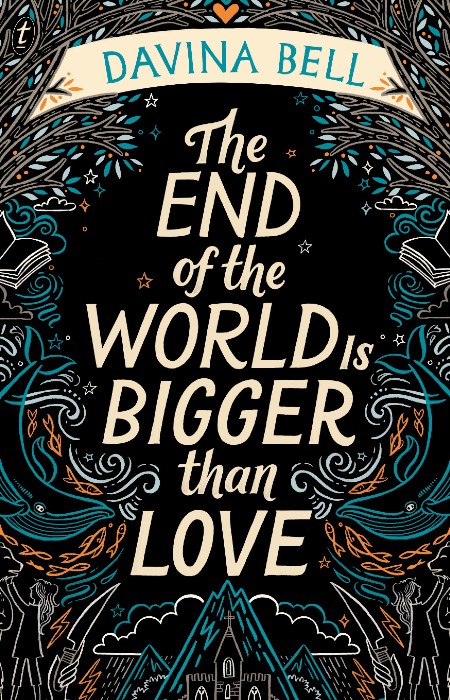
By its very nature, writing lends itself to great, vaulting leaps of imagination.
Stories vary greatly and may take you to worlds magical or thoughtful, startling or reflective, whimsical or gravely serious; but whatever their tone or intent, every last one of them is underpinned by a surfeit of expansively, rich creativity, the kind that lifts you from the mundane and the everyday and takes you away to places you might never go to in real life.
But some novels are richer in imagination than others and delight you in ways that go far beyond a simply tilt away from the day-to-day.
Case in point is The End of the World is Bigger Than Love by Davina Bell, which is awash in a vibrancy of storytelling so idiosyncratic, affecting and meaningful that it is hard not to be swallowed whole by it and be glad you have joined twin sisters Summer and Winter in their idyll at the very end of the world.
Although quite whether it is an idyll remains to be seen.
Granted, their lives are cosily confined to a safe, small, luscious island which is rich in their departed father’s stockpiled food and their mother’s treasure trove of classic literature but as The End of the World is Bigger Than Love goes on, it becomes clear that life is perhaps not as wonderful as it may first appear.
“You might be wondering right about now how we managed, two tweenaged girls all alone, not connected to anyone anyhow, gadgets or otherwise, and in a church to boot, not, like, a laser-tag arena or a mall after closing time, or any other place you might imagine being locked in if you had to write an essay about it for school.
Well, we had the mountain, which was like a grandfather clock, or maybe even a grandfather, ancient and solid and friendly … then don’t forget about the books, my mother’s books, all those juicy classics, and there were so many of those that by the time we got to the end of her collection, we were excited again about the ones from the beginning.” (P. 11)
A lot of that has to do with the fact that Summer and Winter are very different people and want very different things from life.
That’s never discussed, of course, since the first rule of any apocalyptic sanctuary is to keep your head down, don’t attract attention and be grateful for being alive when so many around the world are not.
But the fact remains that each is quietly dissatisfied with their small “l” lives, partly because they remember a time when they travelled the world with their emotionally-remote scientist father, but also because, as teenagers, they have to wish for more than simply staying safe.
These unarticulated fissures in their devoted sisterly relationship come screaming apart when the mysterious Edward appears, seemingly out of nowhere, beguiling Winter and causing Summer to wonder if her future is as intimately entwined with that of her sister’s as she thought.
Alternating between Summer’s garrulously expansive accounting of events and Winter’s more introverted and reflective recollections, The End of the World is Bigger Than Love provides a rich study of how two very different but deeply connected people perceive and react to the same set of events.

What makes this novel such a richly enjoyable and yes, magical read – apparently it is possible for the end of all things to have a certain imaginative zest to it – is that Bell manages to brilliantly mix the sublime and the beautiful in with the painfully, groundedly human in ways that really make an emotional impact.
So it is that Summer can hold a lifechanging conservation with a dying Blue Whale – who really shouldn’t be there because in a world blighted by advanced climate change and a pandemic known as “The Greying”, they are officially extinct – or Winter can wander the hills with a mysterious young man who may be nothing like he appears.
Their concerns and the truth of their past existence are very real and very pressing, and encompass some traumatic emotional moments, but there is an imaginative luminosity to the story which means that even in the darkest moments, there is a sense that a rich, quirky imagination is at work here.
It means that The End of the World is Bigger Than Love is able to tackle some fairly weight, intense issues that on their own might be starkly and too painfully overwhelming without feeling as if it is disappearing into a place so intimidatingly dark that no one will want to accompany it.
The fact of the matter is that because of Bell’s gloriously well-executed mix of the fey and fantastic and the seriously grim, you happily read about all manner of terribly dark end of the world things, all of which, rather unsurprisingly, have great bearing on our world right now.
“I will say it again in case you missed it: the world had stopped turning, just like they say might happen in corny love songs if the lovers are ripped apart, and little did we know there were earthquakes rumbling all around the rest of the planet, like deeper hunger pangs, a blanket of fog was settling down on the top of the cold slabs of sea, like when you toss a doona up over your bed and it drifts down in perfect rumples that make you want to lie on top of it immediately.” (P. 109)
The world in which Summer and Winter begin their lives, and one which they have been told no longer exists.
But as The End of the World is Bigger Than Love moves magically and movingly on, and the sisters learn more about their past and the events that led them to this island, and discover their future may not be as limiting as they might have imagined, it begins to look as if the end of all things might not be quite as final as portrayed.
But that is a matter for an ending left to the reading; what matters now is how wonderfully well The End of the World is Bigger Than Love talks about love and connection and the sacrifice that emerges from them, or how grief, palpable, heartrending grief, can exist unspoken in the midst of a seemingly blissfully perfect albeit small world.
But nothing is ever perfect, not a person or a home or a past, present or future, and as Summer and Winter grapple with their manifest imperfections of their post-Edward lives and how nothing they believed or thought is as real as they had allowed themselves to believe, The End of the World is Bigger Than Love becomes increasingly ever more magical but ever more painfully real too, a merging of hope and loss that can’t feel to impact in real and far-reaching ways.
The key lesson of The End of the World is Bigger Than Love is that even at the end of the world, things are not what they seem, either because of deliberate deceit or necessarily protective self-delusion, and that painful though it may be hard to face up to the truth and cold, hard reality of the world, with the attendant, all consuming cost that entails, that it is ultimately the best and only way forward, changing everything as you take those first tremulous but unavoidable steps forward.